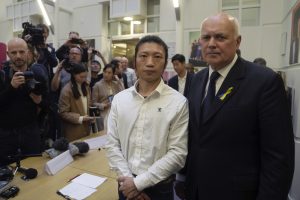On October 16, a Hong Kong protester in Manchester, England, was dragged onto Chinese consulate grounds and beaten by unidentified staffers. The violence broke out as individuals emerged from the consulate and began destroying protesters’ posters, which depicted Xi Jinping wearing only a crown and underwear. As they retreated, the men pulled a nearby protester inside the consulate gates and kicked him repeatedly on the ground. Manchester police eventually separated both parties, but not before eyewitness video had ignited the latest China-U.K. diplomatic controversy. The consulate’s actions – reactionary, violent, and indiscreet – mark the latest sign of China’s new diplomatic style under Xi Jinping.
Regardless of their overseas stations, Xi’s diplomats now retain a second, all-important audience: Chinese citizens back home. Harsh rhetoric, offensive tweets, and occasional violence all echo rising levels of domestic nationalism. For China’s “netizens,” fiercely patriotic and perpetually online, this new style symbolizes China’s power to assert itself on the international stage – a China that can say no. Projecting domestic narratives of strength appears just as relevant as promoting peaceful relations abroad. When the two objectives collide, as they did in Manchester, Xi’s diplomatic core increasingly pursues the former at the latter’s expense.
Official rhetoric at the 20th National Congress of the Chinese Communist Party (CCP) affirmed China’s changing diplomatic norms. At a press conference titled “Under the Guidance of Xi Jinping Thought on Diplomacy, Forge Ahead and Strive to Break New Ground for Major-Country Diplomacy with Chinese Characteristics,” officials Ma Zhaoxu and Shen Beili hailed the “fighting spirit” of Chinese diplomacy under Xi. “Having the courage and ability to carry on the fight is a fine tradition and distinct characteristic of Chinese diplomacy,” Ma, the current vice minister of foreign affairs, added in his remarks.
In this sense, the recent scuffle in Manchester was well-applied Xi Jinping Thought on Diplomacy. In a Sky News interview released Wednesday, China’s Consul General Zheng Xiyuan responded to photos showing him pulling the pro-democracy protester by the hair into consulate grounds. “He abused my country, my leader. It’s my duty,” Zheng argued. His comments may sound hyper-nationalistic to foreign audiences, but only because Zheng is pitched for China’s domestic wave of patriotism.
Once a fringe tactic, “wolf warrior diplomacy” is now an increasingly mainstream position for Chinese diplomats. The term, a nod to China’s “Rambo”-like film franchise by the same name, describes a combative, nationalistic approach to foreign communication. Zhao Lijian, China’s notorious Ministry of Foreign Affairs spokesperson, is considered among the earliest adopters of this diplomatic style. In 2019, Zhao posted a now-deleted tweet on racial discrimination in Washington, D.C., claiming white people intentionally avoid specific neighborhoods “because it’s an area for the black & Latin.” Despite the political turmoil left in his wake, Zhao continues to receive promotions within Xi’s diplomatic core. His Twitter account, launched in 2010, now boasts over 1.3 million followers. Zhao’s successful advancement of wolf warrior diplomacy is a testimony to China’s emboldened thinking under Xi. There is an audience – albeit not a foreign one – for this type of diplomacy.
Chinese diplomats seemingly learned a critical lesson from Zhao’s career trajectory: measure success by domestic approval, not foreign metrics of competence. In October 2020, a Taiwanese diplomat in Fiji was hospitalized with a head injury after an altercation with two Chinese diplomats. Fighting allegedly broke out after the Chinese diplomats arrived uninvited to a Taiwanese National Day celebration and began photographing guests. Back in Beijing, Zhao, acting as Foreign Ministry spokesperson, denied claims of the violence. “First of all, Taiwan does not have any so-called diplomats in Fiji,” he contended.
China’s low-profile, bureaucratic diplomacy of the past, first characterized by Deng Xiaoping in the late 1980s, is a relic of the country’s former status. It not only conflicts with Xi’s “fighting spirit” vision for Chinese diplomacy, but more fundamentally, the CCP’s reliance on domestic nationalism as a source of regime legitimacy. In Manchester, Fiji, and around the world, the message is clear: fight back against foreign criticism. Patriotism, not peace, is the orienting element of China’s diplomacy under Xi Jinping.

































